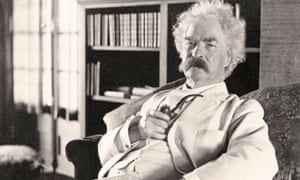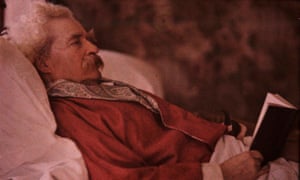Mark Twain, whose 3,000-item family library was spread across America.
Photograph: Alamy
Photograph: Alamy
Why would one man read Mark Twain's whole library?
Alan Gribben has spent 45 years navigating fakes and tracking down lost tomes to study Samuel Langhorne Clemens’s book collection
What if you could make a list of everything Mark Twain ever read and of every book he ever owned?
Dr Alan Gribben, cofounder of the Mark Twain Circle of America, has spent the last 45 years doing just that. But why?
As a steamboat captain, Twain – real name Samuel Langhorne Clemens – lived on the river, his life and work in constant motion as he authored travelogues, time-travel novels and adventure stories about runaway slaves.
Would he have wanted a list out there, nailing down the precise location of every book he had owned?
Whether he would or not, literary scholars do. In the New Historicism school of literary thought, writing is examined in its authorial context.
Heaven forbid someone read Twain’s story.
Answering the last of these questions has been difficult.
In addition to riverboating, Twain held other jobs that required travel: prospector, reporter, lecturer. Logistically, he couldn’t keep many books and those he did carry were often lost.
In Twain’s defence, many other famous writers made work hard for scholars by misplacing their books. F Scott Fitzgerald lost his between moves, and Ernest Hemingway left an untold number in Cuba.
As a result, between the 1940s and 60s, explains Gribben, “meticulous studies [were] initiated to identify the contents of ... major American authors’ libraries”, cataloging what Ralph Waldo Emerson, Herman Melville, Emily Dickinson and others had read.
Yet somehow Twain got left out and, as Gribben notes, those studying him “had to check dozens of disparate sources that revealed bits of his literary knowledge”.
Twain photographed in 1908 by Alvin Langdon Coburn.
Photograph: Royal Photographic Society/SSPL via Getty Images
Well, not anymore. In Mark Twain’s Literary Resources, a three-volume work of literary criticism to be published in May, Gribben outlines the reading that influenced Twain, from Shakespeare to Poe. While scholars will certainly benefit, the book itself is more than academic. It’s a labour of love, with Gribben describing how he uncovered Twain’s tomes in basement boxes, even finding some in sacks by the side of a road.
“Twain was, from the beginning, dismissed by many elite critics,” Gribben says. “Even today, there are those who look down their noses at Twain as an unrefined upstart, a lucky opportunist who gained fame merely on the basis of his outrageous humour.”
During his life, Twain could be evasive about his reading, claiming in 1886 that he couldn’t name 100 authors. Other times, he willingly shared his habits with the press, telling New York World Sunday Magazine precisely how many hours he read each day, at what time, and where.
Born Samuel Langhorne Clemens
November 30, 1835
Florida, Missouri, U.S.
Died April 21, 1910 (aged 74)
Redding, Connecticut, U.S.
This, Gribben states, may make doubting critics see Twain as a great author, not merely a funny man from Missouri.
History may not have preserved writers’ libraries as we now do, but there is one thing about literaria that hasn’t changed – the false notion that great words only come from those in the right places.
Link: https://www.theguardian.com/books/2019/apr/01/one-man-read-mark-twain-whole-library-alan-gribben?
Mark Twain statue, Trinity Park, Fort Worth, Texas Photo by Barbara Schmidt © 2010 |
Mark Twain/Quotes
The report of my death was an exaggeration.
It's not the size of the dog in the fight, it's the size of the fight in the dog.
Whenever you find yourself on the side of the majority, it is time to pause and reflect.
Travel is fatal to prejudice, bigotry, and narrow-mindedness.
Kindness is the language which the deaf can hear and the blind can see.
It is better to keep your mouth closed and let people think you are a fool than to open it and remove all doubt.
The secret of getting ahead is getting started.
If you tell the truth, you don't have to remember anything.
The two most important days in your life are the day you are born and the day you find out why.
The difference between the right word and the almost right word is the difference between lightning and a lightning bug.
The report of my death was an exaggeration.
It's not the size of the dog in the fight, it's the size of the fight in the dog.
Whenever you find yourself on the side of the majority, it is time to pause and reflect.
Travel is fatal to prejudice, bigotry, and narrow-mindedness.
Kindness is the language which the deaf can hear and the blind can see.
It is better to keep your mouth closed and let people think you are a fool than to open it and remove all doubt.
The secret of getting ahead is getting started.
If you tell the truth, you don't have to remember anything.
The two most important days in your life are the day you are born and the day you find out why.
The difference between the right word and the almost right word is the difference between lightning and a lightning bug.



